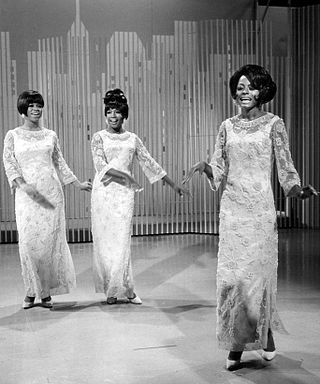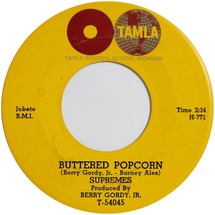
The Supremes were an American girl group and a premier act of Motown Records during the 1960s. Founded as the Primettes in Detroit, Michigan, in 1959, the Supremes were the most commercially successful of Motown's acts and the most successful American vocal band, with 12 number-one singles on the Billboard Hot 100. Most of these hits were written and produced by Motown's main songwriting and production team, Holland–Dozier–Holland. It is said that their breakthrough made it possible for future African-American R&B and soul musicians to find mainstream success. Billboard ranked the Supremes as the 16th greatest Hot 100 artist of all time.
Motown is an American record label owned by the Universal Music Group. It was founded by Berry Gordy Jr. as Tamla Records on January 12, 1959, and incorporated as Motown Record Corporation on April 14, 1960. Its name, a portmanteau of motor and town, has become a nickname for Detroit, where the label was originally headquartered.

Florence Glenda Chapman was an American singer and a founding member of the Motown vocal female group the Supremes. She sang on 16 top 40 singles with the group, including ten number-one hits. After being removed from the Supremes in 1967, Ballard tried an unsuccessful solo career with ABC Records before she was dropped from the label at the end of the decade.

Mary Wilson was an American singer. She gained worldwide recognition as a founding member of the Supremes, the most successful Motown act of the 1960s and the best-charting female group in U.S. chart history, as well as one of the best-selling girl groups of all-time. The trio reached number one on Billboard's Hot 100 with 12 of their singles, ten of which feature Wilson on backing vocals.

The Supremes is a 2000 box set compilation of the material by Motown's most popular act of the 1960s, The Supremes. The set covers The Supremes' entire recording history, from its first recordings as The Primettes in 1960 to its final recordings in 1976.

Harold Edward Davis was an American songwriter and record producer. Davis was a producer and writer for Motown Records for nearly thirty years, and was a key figure in the latter part of the Motown career of The Jackson 5.
Barbara Diane Martin Richardson was an American singer, best known as one of the original members of Motown group The Supremes. She was born in Detroit.

The Supreme Florence Ballard is a 2001 release by Universal Music Group's Spectrum Music. The release compiles the 1968 ABC Records solo recordings of Florence Ballard with four Motown tracks she recorded lead vocals for whilst in The Supremes. The ABC Records album, originally titled You Don't Have To, was shelved and bootlegged heavily preceding the compilation's release. Ballard's second ABC single, "Love Ain't Love", was covered by Udell Anderson in 1969 and by Madeline Bell in 1971. The track "My Heart" was covered and released as a single by Linda Jones in 1969, also produced by Kerr.

Cream of the Crop is the eighteenth studio album released by Diana Ross & the Supremes for the Motown label. It was the final regular Supremes studio album to feature lead singer Diana Ross. The album was released in November 1969, after the release and rising success of the hit single "Someday We'll Be Together."

Meet the Supremes is the debut studio album by The Supremes, released in late 1962 on Motown.
"For Once in My Life" is a song written by Ron Miller and Orlando Murden for Motown Records' Stein & Van Stock publishing company, and first recorded in 1965.

A Bit of Liverpool, released as With Love (From Us to You) in the UK, is the third studio album by the Supremes, released in the fall of 1964 on the Motown label. It was produced by Berry Gordy with Hal Davis and Marc Gordon doing the mixing.

Anthology, also known as Anthology: The Best of Diana Ross and the Supremes, first released in May 1974, is a series of same or similarly titled compilation albums by The Supremes. Motown released revised versions in 1986, 1995 and 2001. In its initial version, a 35-track triple record collection of hits and rare material, the album charted at No. 24 on Billboard's "Black Albums" and No. 66 on "Pop Albums".

"Your Heart Belongs to Me" is a 1962 song written and composed by The Miracles' William "Smokey" Robinson and released as a single by Motown singing group The Supremes during their early years with the label. The song is about a woman whose lover is in the armed forces and has "Gone to a far-away land"; its narration has her tell him to always remember their love for each other if he ever gets lonely.
"Let Me Go the Right Way" is a 1962 song written and produced by then Motown president Berry Gordy and released as a single by Motown singing group The Supremes. It was the group's fourth single and their second charted record following the dismal reception of their first charted single, "Your Heart Belongs to Me".

"Nothing but Heartaches" is a 1965 song recorded by The Supremes for the Motown label.

"In and Out of Love" is a 1967 song recorded by The Supremes for the Motown label. It was the second single issued with the group's new billing of Diana Ross & the Supremes, the penultimate Supremes single written and produced by Motown production team Holland–Dozier–Holland, and the last single to feature the vocals of original member Florence Ballard.
"I Want a Guy" is a song written by Freddie Gorman, Berry Gordy and Brian Holland and was the debuting single for Motown girl group The Supremes in 1961. It was also recorded by The Marvelettes on their album Please Mr. Postman. Featuring Diana Ross in lead, the song was a doo-wop ballad similar to what the Supremes had been recording since forming as "The Primettes" two years earlier.
"After All" is a 1960 song written by Smokey Robinson and originally recorded and released by The Miracles on the Tamla label. It was first recorded as an unreleased single by The Supremes for Tamla; it was supposed to be their first single but it was canceled in favor of "I Want a Guy", and their cover wasn't released until it appeared on the 2000 box set, The Supremes. The song is noted for both groups' unusual choices for leads. For the Miracles' version it serves as a rare lead for Claudette Rogers Robinson, instead of the group’s main lead, Claudette's husband, Smokey Robinson. In the Supremes' case it is their only single to feature Barbara Martin singing on lead vocals. Florence Ballard, Mary Wilson, and Diana Ross sing verses, and Martin sings the bridge. "After All" was also later covered by The Marvelettes, in the early 1970s, with group member Wanda Young Rogers as lead. Their version appears on the album The Return of the Marvelettes, and later became the group's belated final single.
"Mother Dear" is a 1965 song recorded by the Supremes for the Motown label.













